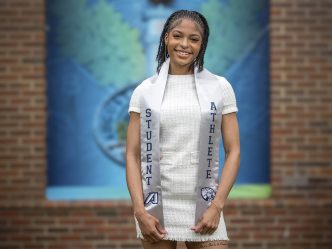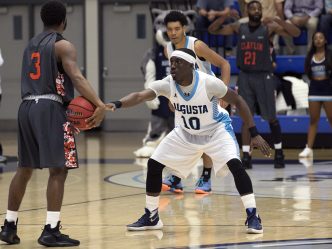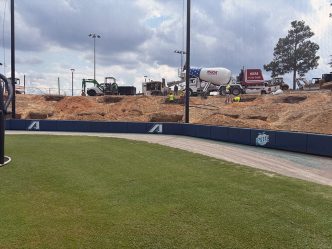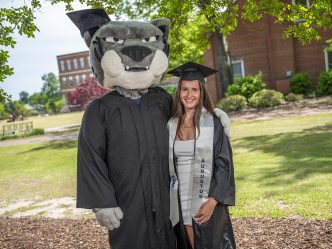The 2020-21 Augusta University men’s basketball season was anything but ordinary. Due to the COVID-19 pandemic, the start of the season was delayed, fans were not permitted into Christenberry Fieldhouse and the Peach Belt Conference postseason was shortened to just four teams.
Coaches and players had no sense of normalcy, and as coach Dip Metress noted, sports are often about routines — and there was no routine.
“COVID made people scared and anxious, and that applied to the sports world as well,” he said.
For junior Miguel Arnold and graduate student Troy Cracknell, just getting a chance to play again will help erase the hurdles they faced last season.
Thrown a curveball
The duo said last year was unusual because they never knew how things were going to play out. Arnold said they had a good team the year before for the 2019-20 season, but then the postseason was canceled as they were en route to the Lincoln Memorial in Tennessee for the first round of the NCAA Tournament.
Cracknell said after that season ended early and the 2020-21 season was shortened, it made for an uncomfortable and irregular year.
When the school year went virtual in March 2020, Cracknell returned to Charlotte, North Carolina, while Arnold spent some time with family who live in the Virgin Islands to mentally reset.
When the start of the new season was nearing, players were told they would get tested two to three times a week during both the preseason and regular season. Players who tested positive for COVID-19 had to quarantine for 14 days.
Lisa-Anne Cummins has been the head athletic trainer at Augusta University for the past three years and was assistant for 15 years before that. She said the first hurdle the NCAA had was creating a policy for testing athletes and tracking their symptoms. She said they were able to utilize their existing concussion testing program to also track athletes’ daily symptoms.
“The program we used was called Sway, and the athletes would log in to it daily to report any symptoms or no symptoms,” she said.
The second hurdle was figuring out how and when they were going to test the athletes. “Each sport was placed in a different classification of risk: High risk was basketball, football, volleyball and wrestling because they did not wear masks, just to name a few,” Cummins said.
“Baseball and softball were considered medium risk, and the outdoor sports like golf, tennis and track and field were considered low risk. Each of the classification levels required different testing strategies for off-season, pre-season and in-season, so we had to plan on exactly how to execute these strategies as well as the cost for testing the athletes.”
Arnold and Cracknell had no issues regarding the testing procedures.
“I had no concern for the testing procedures … all the trainers were very responsible with keeping up with all the teams to make sure everybody was tested and making smart decisions,” Cracknell said.
Dealing with COVID-19
Cummins said testing went well last year, as there were never any complaints from players. Players who tested positive were not able to practice or play. A big part of her job was notifying players and organizing living arrangements if necessary.
She also mentioned that if a player tested positive, they had to track the positive test date, as that athlete would be removed from surveillance testing for 150 days afterward.
Just before Christmas, Arnold and Cracknell tested positive. They were roommates and quarantined together. Arnold had plans to go home to Puerto Rico, but purposely didn’t tell his mother he was sick because he didn’t want her to worry.
“After we had both tested positive, we had to get an electrocardiogram [EKG], which tested for any abnormalities in the heart,” Cracknell said.
“Unfortunately we both had some problems, which led to us having a cardiac MRI, which uncovered that we both had inflammation within the heart. This caused us to sit out from basketball for three months.”
According to a News Medical Life Sciences article, cardiac abnormality, including myocarditis, has been shown in a large proportion of patients hospitalized for COVID-19. Given that myocarditis is associated with sudden mortality in athletes, attention has turned to the risk of myocarditis following COVID-19 in highly active people. Researchers are establishing the effectiveness of cardiac evaluation in determining when athletes are fit to return to training post-infection.
The Jaguars had five players that spent Christmas at University Village. Members of the community stepped up and provided food as much as possible.
Basketball takes a backseat
Cummins worked with Shelli Larkin in Student Health Services to get all the athletes who tested positive scheduled for a cardiac screening as soon as they were able to leave isolation and before returning to practice.
“The day an athlete left isolation, they went to student health for an EKG. If that was normal, then they followed a seven-day return to play protocol to work back into full practice,” Cummins said. “If the EKG came back abnormal, I worked with Brooke Meyers to schedule the athletes with Dr. Adam Berman in cardiology, where they went through further testing.
“Neither Troy nor Miguel had had any symptoms other than congestion, so when they got the results back from the cardiac MRI, they were both shocked that something was seen on their heart. Miguel consistently tried to get me to let him practice or run or shoot; Troy listened to what the physician told him and did not try to do anything other than rest. Finally both were cleared to return in May.”
In all, Arnold and Cracknell missed all but two games last season. Arnold, who has been playing sports since he was 3 years old, said not being able to be on the court was difficult.
But more than anything, he was grateful for the way Cummins cared for them.
“She just told us not to get be sad about it. She told us that it is better for us to err on the side of caution than go out there and something happen to us,” Arnold said. “She just kept taking care of us.”
Reflecting on Cummins’ care, Cracknell said it’s always great to have someone by your side supporting you when things aren’t going well.
“My parents were very understanding and supportive throughout it all, and especially Ms. Lisa [Cummins] and the training staff for being there for the whole team and helping it stay safe and keep us informed about COVID. I can’t thank them enough,” Cracknell said.
“Coach Dip was frustrated due to all the difficulties of last season, but was always supportive for all of us while we had to sit out.”
Showing their appreciation
Metress said he was grateful for Cummins and the medical staff at AU Medical Center for taking care of the players.
“Being a medical college, I knew they would be provided excellent care,” Metress said.
“Troy’s mom was on the appointments virtually … She has a background in health care so she was a great resource with her questions. I went with Miguel to his appointments; it was very stressful watching him get his exams and not knowing if his career would continue. There were a lot of unknowns.”
Arnold had a scratch on his heart as a result of COVID-19, which forced him to miss the rest of the 2020-21 season. He said the medical team did a great job of comforting and taking care of him.
“I was scared, honestly, because it’s my heart, but they were great. They made me feel really comfortable,” Arnold said. “They made me feel like I was at home. I don’t remember the last time I went to a hospital, but I think they did a great job. They kept me calm the whole time.”
Cracknell agreed that the staff was supportive and informative about the whole situation, adding that “all the nurses there were very nice and comforting.”
As the players begin the 2021-22 season with Arnold and Cracknell on the floor, Cummins won’t soon forget how stressful their health scare was on her and other athletic trainers. She’ll continue hoping she and the rest of the men’s basketball team made the right decisions for them.
“During that time I thought, ‘Was there something else that I should be doing, or something else we could do for them medically than what we were doing?’ It was a year that I hope we do not have to repeat any time soon.”
Arnold can’t wait for the season to start, and got a little choked up when he thought about being able to suit up again.
“I can’t even tell you … We had scrimmages last week and I was just excited,” Arnold said. “When we have home games and actually get our fans back, it’s going to be amazing.”
 Augusta University
Augusta University




